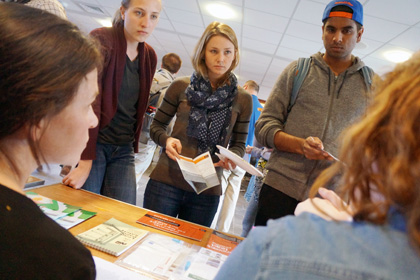When University of Vermont Class of 2019 medical student Jacob Reibel and the six other classmates in his group selected their public health project earlier this year, they wanted to get out of the classroom and into the field – literally – to talk to Vermonters about their health concerns.

Class of 2019 students (L to R) Maia Sakradse '19, Allison Greene '19, and Suven Cooper '19 visit the Burlington Lead Program table at the Public Health Projects "speed-dating" event in June 2016. (Photo: UVM COM Design & Photography)
When University of Vermont Class of 2019 medical student Jacob Reibel and the six other classmates in his group selected their public health project earlier this year, they wanted to get out of the classroom and into the field – literally – to talk to Vermonters about their health concerns.
He and his group will spend the next few months doing just that, meeting with Vermont farm workers to learn how their occupation influences the risk of developing or worsening asthma and other respiratory problems. The students’ project for the American Lung Association in Vermont will provide insight on the impact of farming on lung health.
“Our group was interested in getting out into the community and visiting some farmers and talking to some of these workers,” says Reibel. The students hope “to put a face to the patient population that we’re learning about.”
All UVM College of Medicine second-year students are required to undertake and complete a public health project. In the spring of their first year of medical school, each group of about seven or eight students reviews the project options at a “speed dating” type of event, at which 16 different agencies/organizations showcase their projects that seek to answer a question or solve a problem.
The student groups then rank their top project picks and college faculty “match” the student groups to the projects, attempting to give them their top choices.
“We get a pretty good distribution and a variety of interest among the students, so that the match works out,” says Jan Carney, M.D., M.P.H., UVM senior associate dean for public health and course director for the Public Health Projects. “Different projects resonate with different student groups.”
The Class of 2019’s topics include the Burlington Lead Program’s goal to raise public awareness about lead poisoning prevention; perceptions on health care among newly arriving Vermont refugees for the state’s Department of Health; and an evaluation of the effectiveness of Vermont CARES’ syringe exchange programs for preventing the spread of HIV.
Projects for the American Cancer Society of Vermont and the American Heart Association will focus on public policy advocacy, which is an increasing area of interest for UVM medical students, Carney says.
At her kickoff presentation in late August, Carney explained to the students that their projects are pivotal to the organizations, which use the results to make decisions and create programs that benefit not only communities in Vermont, but across the nation as well.
“The goal is to help you be better doctors,” she told members of the Class of 2019. “These are tough problems, and they need creative solutions.”
It’s a rigorous schedule. The groups have a total of four months to first choose the specific goal or question they will pursue, read literature on the topic, develop a plan of action – either a survey or other assessment tool – conduct that research and report on their findings in the form of a poster. Ten groups from the Class of 2018 will be presenting their posters at the American Public Health Association annual conference in Denver, Colo., October 29 to November 2, 2016.
Each group has a project mentor, a College of Medicine faculty member who guides the students and keeps them on track. Mark Fung, M.D., Ph.D., UVM professor of pathology and laboratory medicine, has overseen the College’s public health projects for the American Red Cross for a decade, helping students tackle many ambitious topics. In 2008, his group completed a randomized, controlled trial on the use of text messaging to remind donors to give blood. A 2010 project that looked at whether 16-year-olds should donate blood resulted in the Vermont legislature lowering the legal donation age from 17 to 16.
“So they walk away with a recipe of how to conduct a study in the future,” Fung says. “You hope they take away the need to ask the best question you can ask that you’re simultaneously interested in and capable of answering.”
Class of ’19 student Katherine Clifford’s group embraced the challenge brought by The Converse Home, an assisted living and memory care center doing its first UVM public health project, to find out whether poetry can stimulate cognition and brain activity for dementia patients the same way music can. The students will spend time with Converse Home residents as they read and write poetry and assess whether that activity improves overall wellbeing and health.
“We really liked the idea of the project in that it was a little more service-oriented,” Clifford says. “It actually involved us going to the site and working with patients.”
That interaction is a key objective of the public health projects, Carney says. “We want the students to learn by doing,” she says. “They have to get out of the building and go out into the community.”